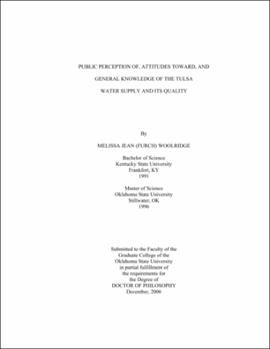| dc.contributor.advisor | Caneday, Lowell | |
| dc.contributor.author | Woolridge, Melissa Jean (Furch) | |
| dc.date.accessioned | 2013-11-26T08:29:53Z | |
| dc.date.available | 2013-11-26T08:29:53Z | |
| dc.date.issued | 2006-12 | |
| dc.identifier.uri | https://hdl.handle.net/11244/7126 | |
| dc.description.abstract | Scope and Method of Study: The purpose of the investigation was to identify the public's perception, attitudes, and general knowledge of the water quality for the city of Tulsa, Oklahoma. Additionally, public perception was examined in terms of knowledge of the risks of contamination to drinking water. The attitudes of people were studied as they related to taste, odor, and interest in water quality, and the attitudes regarding the taste and odor of the drinking water. The goal, in terms of subject selection, was to get members of the general public who have varied interest in water quality as well as a balance of the members of the public regarding their gender, age, race, and economic status. | |
| dc.description.abstract | Findings and Conclusions: Overall, most of the city of Tulsa residents that reside in the 74105 zip code (63 out of 109 total respondents) perceived that the quality of their drinking water was "good." Additionally, frequency tabulations also indicated that most (72 out of 110 total respondents) were inclined to believe that the overall safety of their drinking water was "good." The study also revealed that residents' top concern was protection for the water quality in the Tulsa area. Bacteria and poultry bi-products were perceived as the number one threat in the area and statewide. People with a higher income perceive a higher quality to their drinking water than do people with lower incomes. Men also perceive a higher quality to their drinking water than do women; and, men were stronger in their support for the Clean Water Act than were women. Finally, a considerable amount of people (47 out of 108 total respondents) agree that we need stronger federal laws to protect water quality but they do not believe that drinking water contamination is a problem, where they live (50 out of 107 total respondents Agree or Strongly Agree). | |
| dc.format | application/pdf | |
| dc.language | en_US | |
| dc.rights | Copyright is held by the author who has granted the Oklahoma State University Library the non-exclusive right to share this material in its institutional repository. Contact Digital Library Services at lib-dls@okstate.edu or 405-744-9161 for the permission policy on the use, reproduction or distribution of this material. | |
| dc.title | Public perception of, attitudes toward, and general knowledge of the Tulsa water supply and its quality | |
| dc.contributor.committeeMember | Perry, Katye M. | |
| dc.contributor.committeeMember | Kimball, Sarah | |
| dc.contributor.committeeMember | Bryant, Richard | |
| osu.filename | Woolridge_okstate_0664D_2058.pdf | |
| osu.accesstype | Open Access | |
| dc.type.genre | Dissertation | |
| dc.type.material | Text | |
| thesis.degree.discipline | Environmental Science | |
| thesis.degree.grantor | Oklahoma State University | |
